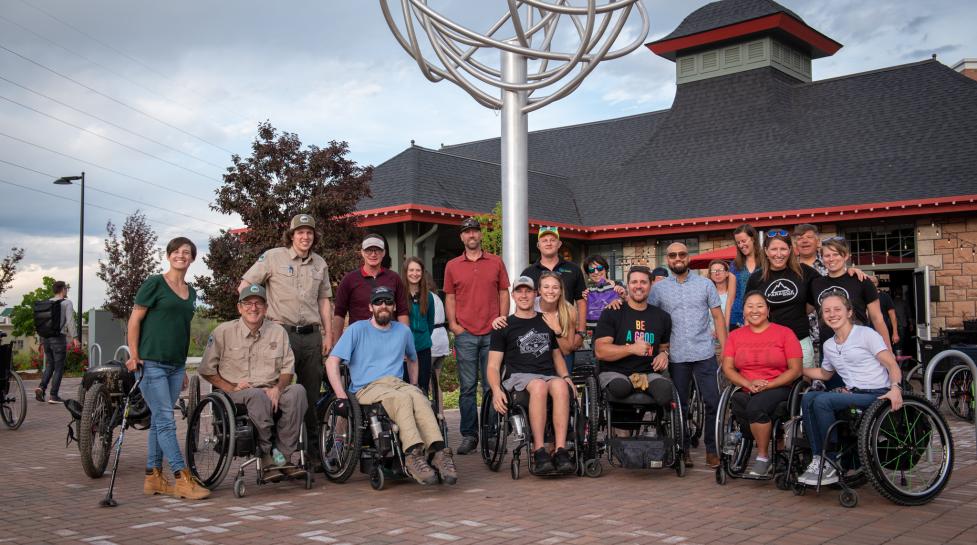Disability Pride Month is observed every July to celebrate the passage of the Americans with Disabilities Act (ADA) in 1990.
This year marks the 32nd anniversary of the ADA. With nearly 7% of Boulderites having a disability, the City of Boulder strives to create an inclusive and equitable community by providing the services and support needed for every community member to thrive.
Here are five ways the city is supporting accessibility in our community:
1. Providing accessible digital services and information
A key focus area for the city’s digital services centers is on improving user experience by providing consistent, reliable, simple and intuitive services that are accessible for everyone.
The City of Boulder website, bouldercolorado.gov, was designed to follow best practices for readability and compatibility with assistive devices such as screen readers. Recognizing that there are still areas of improvement, we are continually making improvements to ensure that the information on the city website is accessible to all. Our goal is to deliver a web experience that achieves “Level AA” conformance according to the Web Content Accessibility Guidelines v2.1 (WCAG 2.1). This work aligns with new legislation adopted by the Colorado General Assembly. Bill HB21-1110 makes it a state civil rights violation for a government agency to exclude people with disabilities from receiving services or benefits because of lack of accessibility.
Accessibility improvements on bouldercolorado.gov are ongoing and users are encouraged to report issues and areas of improvement by using the contact information on the city’s Accessibility Statement webpage.

2. Building a transportation system that supports mobility for all
Mobility – being able to able to get where you need to go safely, conveniently and efficiently – is a fundamental right. Through the Accessible Boulder project, the city worked with local accessibility advocacy groups to learn the challenges people with disabilities face as they navigate Boulder’s transportation system and is developing a plan to implement these findings across new transportation projects.
Having accessible public transportation options is also key to supporting mobility for all. The city annually contracts with Via Mobility Services to provide door-to-door paratransit services for older adults and people with mobility limitations in Boulder. Via expects to provide approximately 42,000 paratransit trips for people in Boulder this year.
Mobility barriers are also a key concern of the city’s upcoming Vision Zero Action Plan, which will identify ways to make our streets safer and reduce severe crashes. You can use our interactive map to identify locations where you or a loved one experiencing mobility challenges has felt unsafe.
3. Making our trails accessible to everyone
The city recognizes the importance of providing a variety of outdoor recreation opportunities for people of all abilities and has adopted design standards for accessible trails based on federal guidelines. The city's Open Space and Mountain Parks (OSMP) department has published a guide for people with disabilities, the Boulder OSMP Accessible Trails and Sites. In addition, since It can be stressful to many people with disabilities to go somewhere and not know what kind of obstacles they are going to encounter, the city put together short fast motion videos showing the entire accessible trail hiked by OSMP staff member and wheelchair user Topher Downham, to help make hiking Boulder’s beautiful trails easier, more available and more enjoyable for people with disabilities.

4. Helping older adults age well
The city has the mission to inspire and empower older adults dealing with disabilities to age well through community connection, learning and play. The city’s Older Adult Services division offers all adults 60 and over a safe and welcoming environment. We are committed to supporting an age-friendly community through our work on anti-ageism, Lifelong Colorado, mitigating social isolation and encouraging community engagement. Our staff provides a continuum of services from health and wellness, lifelong learning to case management and supportive services. You can sign up for the Age Well newsletter on the city’s website.
5. Providing recreation programs for all abilities
Recreation should be available for everyone! The Parks and Recreation Department created the EXPAND program to be inclusive of individuals with disabilities and build social skills, promote development and growth, enjoy physical fitness, and have fun.
The majority of the EXPAND programs are for people with developmental disabilities. Through inclusion services, we also support anyone needing additional assistance in a general recreation program to be successful.
Some examples of the programs include a summer camp experience for teens with developmental disabilities called Camp Amico, classes on Legos or bowling or music, and Special Olympics gymnastics training.
Learn more about EXPAND and see the latest programs in the Fall Recreation Guide.
Learn more about the ADA in the City of Boulder at the City of Boulder page on the Americans with Disabilities Act.

